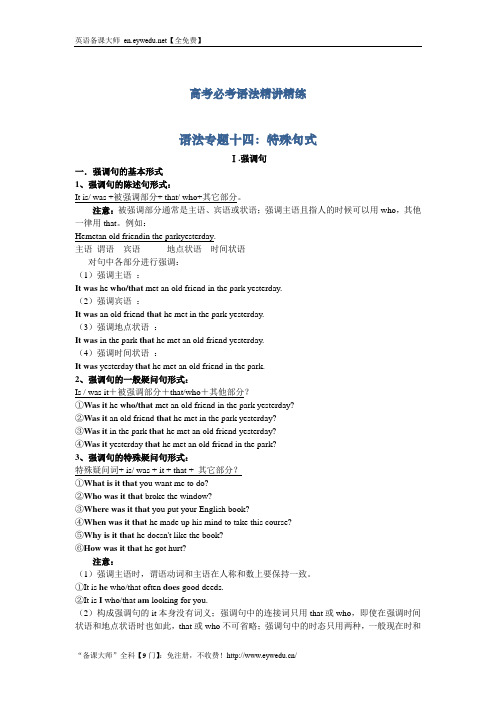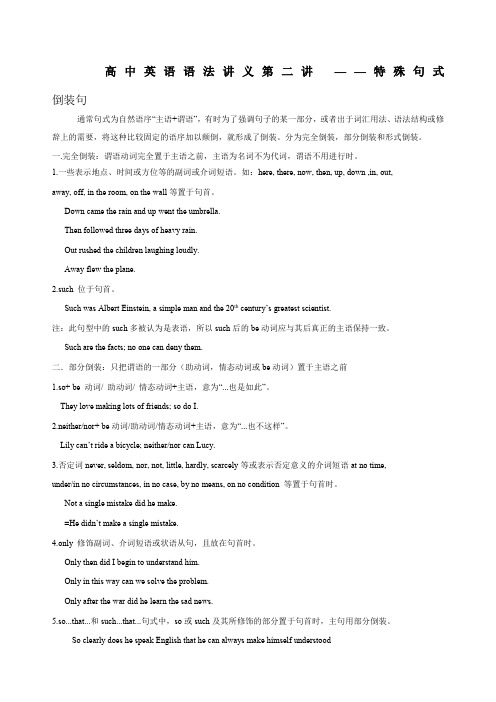高考英语必考语法学案解析版专题十四:特殊句式
高中英语倒装句等特殊句式讲义以及练习题(高考总复习,纯干货,原创)

第一个我们来学习倒装句,倒装属于单选常考的知识点,而且也是写作中的较高级句式了。
一、倒装:完全倒装、部分倒装、形式倒装(假倒装)***倒装句口诀:地点全倒装,son也虚假关于完全倒装“地点全倒装”的意思是:句子中将表示地点、时间等方位位置或者时间的副词、介词等词提前时,句子要全部倒装。
全部倒装的句式结构:地点+谓语+主语。
1.表示地点方位位置的副词、介词,运动方位的副词(under,there,here,out,in,up,down,away,near,opposite……)、时间的副词(now,then)位于句首时, 句子要全部倒装。
A girl sits under the tree倒装后变为Under the tree sits a girl.注意完全倒装中,代词做主语不倒装.如果说这句话是代词做主语:She sits under the tree.那么即使是将描述地点的介词提前,这句话也不倒装,而是变为Under the tree she sits.练习题(1)A bus comes here.= _______________________________________________________ 练习题(2)Your turn comes now.= ____________________________________________________Here/there句型用一般现在时,代词做主语不倒装;Here you are. Here it is.关于部分倒装口诀的下半句中“S on也虚”对应部分倒装,我们来看一下部分倒装的结构。
部分倒装的句式结构:就是将部分倒装标志词提前以后,句子变为一般疑问句语序。
即:标志词+助动词/be动词/情态动词+主语+其他……S:So/such……that……(注意:“主倒从不倒”,也就是说是so/such所在的主句倒装,that后的从句不用倒),看例句:He speaks English so clearly that he can always make himself understood.=so是标志词,所以so clearly这个意群提前(举个例子来说意群:一辆出租车来了=来了一辆出租车,其中“一辆出租车”这几个字不能拆分,它就是一个意群),然后再将主句调整为上边说的部分倒装句式结构。
(完整版)高考英语特殊句式经典讲解.docx

英特殊句式1.句: It be⋯接that/who其它1.去掉句型后,仍完整。
2.可以,主,,状。
3.状,常含有介,接用 that.4.部分含有定从句。
5.与 not ⋯ until状合, not 和 until 在句中挨着。
6.句的特殊疑形式;疑⋯be.. it..that.. ,序考7.句的特殊疑形式,若在从句中,疑⋯ it..be ⋯ that8.构的省略形式,即被部分后的省略。
9.do(does, did,)用在原形前意必,确。
(只能用于一般式的肯定句 )(1) They couldn ’t say ___it was _____troubled them.A. what; thatB. what, whatC. that whatD. what who (2) It is not who is right but what is right _____ is of importance.(3) It was in China ____Tom first met Mr. Lin.(4) It was ____back home after the experiment .A. not until midnight did he goB. until midnight that he didnC. not until midnight that he wentD. until midnight when he didn’ t go ’t go(5) ---Where did you get to know her ?---It was on the farm _____we worked .A. thatB. thereC. which D .where2.倒装1.与之相的是述;若使用倒装,在句子中会出某些迹象2.种 :完全倒装,(提前);部分倒装(助提前)。
3. 完全倒装:( 1)表示地点的介短在句首;( Vi sit ,live , stand , come , run )( 2)副 in , out,up, down, away, off 在句首,(若主是人称代,不倒装)。
专题14 人民解放战争(解析版)

专题十四:人民解放战争【课标要求我知道】1、知道重庆谈判,理解中国共产党为争取和平民主作出的努力;2、了解全面内战的爆发、中共中央转战陕北和刘邓大军挺进大别山等史事;3、通过了解解放区的土地改革,辽沈、淮海、平津三大战役,中共七届二中全会,知道国民党反动统治的覆灭和人民解放战争迅速胜利的主要原因,以及中国共产党领导人民取得新民主主义革命胜利的意义。
【课本内容顺口溜】第23课老蒋三邀毛泽东,发动内战拖时间。
毛泽东亲赴重庆,争取和平来谈判。
双十协定有达成,政协会议有召开。
可惜老蒋毁协议,发动内战四六年。
敌强我弱狂进攻,歼灭敌人运动战。
全面进攻改重点,主动撤离存实力。
消灭王牌孟良固,反动派是纸老虎。
第24课土地政策有修改,实行耕者有其田。
颁布土地法大纲,废除封建剥削制。
土改顺利作用大,激发革命积极性。
战略反攻在四七,刘邓挺进大别山。
决战时机已成熟,辽沈淮海和平津。
辽沈首选在锦州,淮海战役在徐州。
北平和平得解放,渡江战役消灭蒋。
【考点分解提分快】考点1:重庆谈判1945年10月10日,签署“双十协定”;决定召开政治协商会议。
考点2:政治协商会议讨论建立联合政府、和平建国纲领、召开国民大会、修改宪法草案、整编军队等问题,再一次确定了避免内战、和平建国的方针。
考点3:国民党发动内战1、1946年6月,国民党围攻中原解放区,发动了全面内战。
2、1946年10月,国民党军队古领张家口,全面进攻达到最高峰。
3、解放区军民经过半年多的自卫反击战,粉碎了国民党军的全面进攻。
4、1947年3月,国民党军队开始发动对陕北解放区与山东解放区的重点进攻。
考点4:粉碎重点进攻1、陕北解放区:彭德怀率领的西北野战军先后取得青化砭、沙家店等战役的胜利。
2、山东解放区:华东野战军在山东孟良崮消灭国民党王牌主力整编第七十四师。
考点5:解放区的土地改革1、概况:1947年,颁布《中国土地法大纲》。
随后,制定了土地改革总路线:依靠贫雇农,团结中农,有步骤地、有分别地消灭封建性剥削的土地制度,发展农业生产。
高考必考语精讲精练专题十四:特殊句式 Word版含解析

高考必考语法精讲精练语法专题十四:特殊句式Ⅰ.强调句一.强调句的基本形式1、强调句的陈述句形式:It is/ was +被强调部分+ that/ who+其它部分。
注意:被强调部分通常是主语、宾语或状语;强调主语且指人的时候可以用who,其他一律用that。
例如:Hemetan old friendin the parkyesterday.主语谓语宾语地点状语时间状语对句中各部分进行强调:(1)强调主语:It was he who/that met an old friend in the park yesterday.(2)强调宾语:It was an old friend that he met in the park yesterday.(3)强调地点状语:It was in the park that he met an old friend yesterday.(4)强调时间状语:It was yesterday that he met an old friend in the park.2、强调句的一般疑问句形式:Is / was it+被强调部分+that/who+其他部分?①Was it he who/that met an old friend in the park yesterday?②Was it an old friend that he met in the park yesterday?③Was it in the park that he met an old friend yesterday?④Was it yesterday that he met an old friend in the park?3、强调句的特殊疑问句形式:特殊疑问词+ is/ was + it + that + 其它部分?①What is it that you want me to do?②Who was it that broke the window?③Where was it that you put your English book?④When was it that he made up his mind to take this course?⑤Why is it that he doesn't like the book?⑥How was it that he got hurt?注意:(1)强调主语时,谓语动词和主语在人称和数上要保持一致。
高中英语特殊句式全面讲解及练习含答案

高中英语语法讲义第二讲——特殊句式倒装句通常句式为自然语序“主语+谓语”,有时为了强调句子的某一部分,或者出于词汇用法、语法结构或修辞上的需要,将这种比较固定的语序加以颠倒,就形成了倒装。
分为完全倒装,部分倒装和形式倒装。
一.完全倒装:谓语动词完全置于主语之前,主语为名词不为代词,谓语不用进行时。
1.一些表示地点、时间或方位等的副词或介词短语。
如:here, there, now, then, up, down ,in, out,away, off, in the room, on the wall等置于句首。
Down came the rain and up went the umbrella.Then followed three days of heavy rain.Out rushed the children laughing loudly.Away flew the plane.2.such 位于句首。
Such was Albert Einstein, a simple man and the 20th century’s greatest s cientist.注:此句型中的such多被认为是表语,所以such后的be动词应与其后真正的主语保持一致。
Such are the facts; no one can deny them.二.部分倒装:只把谓语的一部分(助动词,情态动词或be动词)置于主语之前1.so+ be 动词/ 助动词/ 情态动词+主语,意为“...也是如此”。
They love making lots of friends; so do I.2.neither/nor+ be动词/助动词/情态动词+主语,意为“...也不这样”。
Lily can’t ride a bicycle; neither/nor can Lucy.3.否定词never, seldom, nor, not, little, hardly, scarcely等或表示否定意义的介词短语at no time,under/in no circumstances, in no case, by no means, on no condition 等置于句首时。
金老师教育高中英语语法 专题14 特殊句式讲解与练习

倒装句英语句子的自然语序是主语在前,谓语动词在后。
把谓语动词放在主语之前,就叫倒装结构。
如果全部谓语放在主语之前,叫全部倒装;只把助动词或情态动词放在主语之前就叫部分倒装。
一、完全倒装1.时间状语now,then等,地点状语here,there, out,in,up,down,away等副词位于句首①Here comes the bus. ②There goes the bell. ③Now comes your turn. ④Out went the children.当代词作主语时,主谓语序不变。
例如:⑤Here it is. 在这儿。
⑥Here he comes. 他来了。
2.当句首状语为表示时间或地点的介词词组时,也常常引起全部倒装①在城市南部坐落着一家钢铁工厂。
South of the city lies a big steel factory.②从山谷里传来了一阵可怕的声音。
From the valley came a frightening sound.3.表语置于句首时,倒装结构为“表语+连系动词+主语”1)形容词+连系动词+主语出席会议的有怀特教授,史密斯教授,格林教授及其他嘉宾。
Present at the meeting were Professor White, Professor Smith, Professor Green and many other guests2)过去分词+连系动词+主语他们可以随心所欲的日子过去了。
Gone are the days when they would do what they liked.二、部分倒装1.If引导的条件状语从句谓语动词为were, had或should时,可省去if,把那三个词挪至句首。
Had you reviewed your lessons, you might have passed the examination.Were there enough hands, we should go on with the project.Should I be free tomorrow, I will come to the party.3.用于“形容词(或名词、动词)+as(though)引导的让步状语从句中”①Pretty as she is, she is not clever. ②Try as he could, he might fall again.如果从句的表语是名词,其名词前不加任何冠词。
高中英语特殊句式考情解读与重点知识梳理

高中英语特殊句式考情解读与重点知识梳理从近几年高考试题来看,特殊句式主要考查倒装句、省略句和强调句的用法。
命题的着重点在以下几个方面:1.考查倒装句式,特别注意以下三种情况:(1)含有否定意义的词置于句首时,部分倒装。
(2)only 位于句首修饰状语等,部分倒装。
(3)so/such...that 句型中,so/such 位于句首时,后面的主句倒装,that 从句不倒装。
2.考查省略句的构成,尤其是以下四种情况:(1)省略主语、主语和谓语、主语和谓语的一部分。
(2)状语从句省略为“连词+非谓语动词”形式,务必要明确句子主语与非谓语动词的逻辑关系以及非谓语动词与谓语的时间关系。
(3)不定式的省略。
(4)not,so,neither,nor 的“替代性”省略。
3.考查强调句型的构成和强调谓语的方法。
近几年高考更加注重考查知识之间的交叉现象,加大了综合考查语法知识的力度,以下几个方面要引起高度重视:(1)强调句型的一般疑问句式和特殊疑问句式的构成。
(2)强调not...until...句型的特殊构成方式。
(3)把强调句型与定语从句、省略句以及强调句型与时间状语从句、地点状语从句的考查等融合到一起考查学生综合把握语法知识的能力。
知识点一、倒装句(一)完全倒装(Full Inversion)谓语动词完全放在主语之前的句子便是完全倒装句。
这类句型主要有:1.表示方式、方位的副词或介词短语,如here, there, up, down, in, away, off, out, in the room, on the wall 等,置于句首,且主语是名词时。
如:In a lecture hall of a university in England sits a professor.在英格兰一所大学的讲堂里坐着一位教授。
South of the river lies a small factory.一个小型工厂坐落在河的南岸。
2024届高考英语语法总复习之特殊句型 课件

倒装句
出于语法结构上或者强调的考虑而进行倒装
全倒装
谓语整体 + 主语
半倒装
助/系/情态动词 + 主语 + (实义动词部分)
全倒装句
There (seem/appear/happen/used to) be/stand/live/remain/exist句型
• There used to live a happy couple who were fond of finding beans.
• On the wall hang some pictures, which makes the room very pleasant. (注意:主语是代词时不倒装,如:Into the thick fog he walked. )
表语在句首
• Present at the meeting were Mr. and Mrs. Smith. • Among all the students stays Lucy.
It is not because I don’t have any money that I go to work everyday.
➢ 注意:强调句与定语从句的区别
It is her that hurts me.(一般定从) It is she that hurts me.(强调句)
➢ 注意:强调句与主语从句的区别
分词 + be + 主
• Gone are the days when we used to be friends. • Standing still is he there, just like a statue.
练习2
1. Out________, with a stick in his hand. A.did the man rush B.rushed the man
- 1、下载文档前请自行甄别文档内容的完整性,平台不提供额外的编辑、内容补充、找答案等附加服务。
- 2、"仅部分预览"的文档,不可在线预览部分如存在完整性等问题,可反馈申请退款(可完整预览的文档不适用该条件!)。
- 3、如文档侵犯您的权益,请联系客服反馈,我们会尽快为您处理(人工客服工作时间:9:00-18:30)。
语法专题十四:特殊句式Ⅰ.强调句一.强调句的基本形式1、强调句的陈述句形式:It is/ was +被强调部分+ that/ who+其它部分。
注意:被强调部分通常是主语、宾语或状语;强调主语且指人的时候可以用who,其他一律用that。
例如:Hemetan old friendin the parkyesterday.主语谓语宾语地点状语时间状语对句中各部分进行强调:(1)强调主语:It was he who/that met an old friend in the park yesterday.(2)强调宾语:It was an old friend that he met in the park yesterday.(3)强调地点状语:It was in the park that he met an old friend yesterday.(4)强调时间状语:It was yesterday that he met an old friend in the park.2、强调句的一般疑问句形式:Is / was it+被强调部分+that/who+其他部分?①Was it he who/that met an old friend in the park yesterday?②Was it an old friend that he met in the park yesterday?③Was it in the park that he met an old friend yesterday?④Was it yesterday that he met an old friend in the park?3、强调句的特殊疑问句形式:特殊疑问词+ is/ was + it + that + 其它部分?①What is it that you want me to do?②Who was it that broke the window?③Where was it that you put your English book?④When was it that he made up his mind to take this course?⑤Why is it that he doesn't like the book?⑥How was it that he got hurt?注意:(1)强调主语时,谓语动词和主语在人称和数上要保持一致。
①It is he who/that often does good deeds.②It is I who/that am looking for you.(2)构成强调句的it本身没有词义;强调句中的连接词只用that或who,即使在强调时间状语和地点状语时也如此,that或who不可省略;强调句中的时态只用两种,一般现在时和一般过去时。
原句谓语动词是与过去相关的时态,如一般过去时、过去完成时和过去进行时等,用It was … ,与现在或将来相关的时态用It is … 。
(3)若强调句的疑问句形式放在宾语从句的位置,则需要用陈述句的形式。
例如:①Do you know who it is that will teach us English?②I really don't know when it was that he went to bed.二.not … until … 句型的强调句句型为:It is/ was not until + 被强调部分 + that + 其它部分。
普通句:He didn’t go to bed until his wife came back.强调句:It was not until his wife came back that he went to bed.注意:此句型只用until,不用till;因为句型中It is/ was not … 已经是否定句了,that后面的从句要用肯定句,切勿再用否定句了。
三.谓语动词的强调1、It is/ was … that … 结构不能强调谓语,如需要强调谓语,用助动词do/ does或did。
例如:①Do be careful when you cross the street.②She does love you.③He did write to you last week.2、注意:此种强调只用do/ does和did ,第三人称单数用does,过去时用did ,后面的谓语动词用原形。
强调句的验证方法:先看句子里有没有It、be动词和that,如果有,去掉It is / was…that 结构,看原句是否为一个完整的句子,如果是,则为强调句,否则就不是强调句。
Ⅱ.倒装句倒装是一种语法手段,用于表示一定的句子结构或强调某一句子成分。
倒装句有两种:完全倒装(full inversion)和部分倒装(partial inversion)一、部分倒装部分倒装可以用于多种时态,常见的情况有:1. 句首状语为否定词(短语)或半否定词的句子要用部分倒装。
这类词或短语主要有never, neither, nor, not,little,few,nowhere,seldom, rarely, hardly, scarcely, no sooner, in no way, by no means ,at no time,in no case ,under no circumstance等。
例如:①Never will I give in.②Not a word did I say to him.③I can't swim. Neither can he.④Little does he care about what I said.⑤Nowhere will you find the answer to this question.⑥No sooner had he gone to bed than he fell asleep.⑦Hardly had he arrived at the station when the train left.⑧By no means will she marry you.注意:Neither…nor…所引导的并列句,前后分句均用部分倒装。
例如:Neither do I know her name,nor does Tom.2. "Only + 状语(副词、介词短语、从句等)"放在句首,句子要部分倒装。
例如:①Only then did I realize the importance of English.②Only by this means is it possible to explain it.③Only when the war was over in 1918 was he able to get happily back towork.注意:“only+主语”位于句首时不倒装。
例如:①But only love can say,try again or walk away.②Only you can help me.3.so或so引导的短语放在句首作状语,要部分倒装。
例如:①I saw the film, so did Mary.②So angry was he that he could hardly speak.③So frightened was he that he did not dare to move an inch.④So loudly did he speak that people in the next room could hear him.⑤So fast did he run that I could hardly keep up with him.4. "Not only + 分句,but also + 分句"句型中的前一分句要部分倒装。
例如:①Not only does John love Chinese, he is also good at speaking it.②Not only did he come,but also he was very happy.③Not only was everything that he had taken away from him ,but also his German citizenship(was taken away).注意:not only...but also...连接主语时,不倒装。
例如:Not only the mother but also the children are sick.5. Not until放在句首要用部分倒装;若是复句,从句不倒装,主句倒装。
例如:①Not until last week did they find the lost bike.②Not until my son had entered the university did he realize the importance of learning English.6.在以often, many a time, now and again 等方式或频率副词(短语)开头的句子中,要用部分倒装结构。
例如:①Often have we made that test.②Many a time has John given me good advice.③Now and again did she come to see me.7.虚拟语气的条件从句中,省略了if后,were, had, should等放在条件句主语前,够成倒装。
例如:①Were I you, I would try it again.=If I were you,I would try it again.②Should it rain tomorrow, we would have to put off visiting Beijing. =If it should rain tomorrow,we would have to put off visiting Beijing.③Had you worked hard at college, you would have got a better job.=If you had worked hard at college,you would have got a better job. 8.由as, though, however构成的让步状语从句,从句要倒装,此种倒装结构比较特殊,一般为:形容词(副词或名词等)+as/though+主语+谓语;however +形容词(副词)+主语+谓语。
